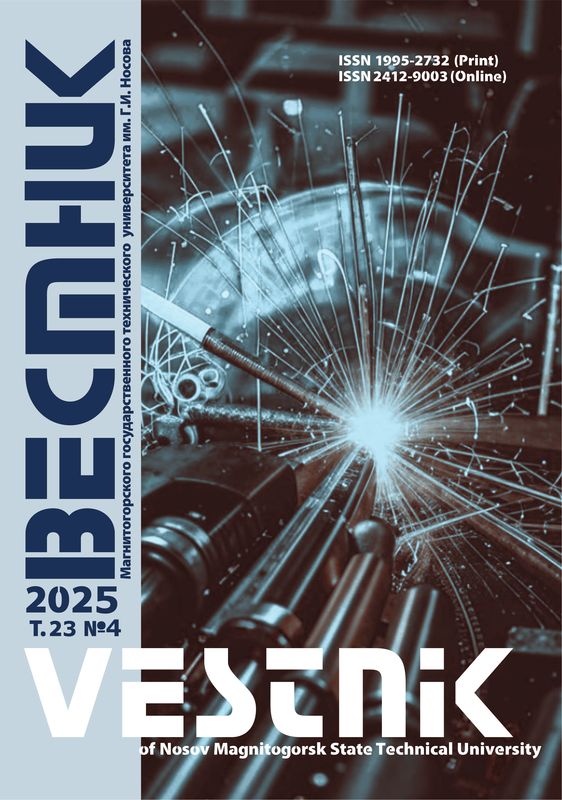DOI: 10.18503/1995-2732-2022-20-2-148-160
Abstract
By analyzing the issue of studying the control process of flexible manufacturing systems (FMS) in the field of mechanical engineering, the authors set a goal, providing for the study on the control of its active elements based on computer experiments. To provide a computer experiment, the paper proposes the architecture of spatial structural modeling of FMS, which is different from conventional modeling methods in time and counted only at the moments, when the system contains the events, changing its state. The paper describes a potential interaction between geometric modeling methods and a system model based on the modules of active elements of FMS. An inference algorithm is proposed based on active data as current situations in the process of comparing products with a fuzzy knowledge base, where active products are selected and a decision is made to develop control actions Ui on the engines of active actions to achieve the ultimate goal of the entire system. As a global database of fuzzy products of the model, the authors use a sensor FMS, whose content dynamically changes after each active action and the control actions generated as a result of a logical inference. To build optimal trajectories of movement of the active elements of FMS in the production environment and determine their collisions, C# modules have been developed, and iterative interaction between the system and a programmer is provided based on a dialog mode, used to build an image of any part of the technological environment of interest at any time and visually monitor the result of introducing changes to the program under development.
Keywords
flexible manufacturing system, structural modeling, uncertainty, logical inference, logic programming, fuzzy production model.
For citation
Ragimov Sh.R., Mamedov Dzh.F. Experimental Study on the Control Process of Active Elements of Flexible Manufacturing Systems Under Uncertainty.Vestnik Magnitogorskogo Gosudarstvennogo Tekhnicheskogo Universiteta im. G.I. Nosova [Vestnik of Nosov Magnitogorsk State Technical University]. 2022, vol. 20, no. 2, pp. 42–49. https://doi.org/10.18503/1995-2732-2022-20-2-42-49
1. Albagachiev A.Yu., Krasko A.S. The loading pattern of a transport-loading facility of a flexible manufacturing system. Problemy mashinostroeniya i nadezhnosti mashin [Problems of Mechanical Engineering and Reliability of Machines], 2019, no. 4, pp. 77–82. (In Russ.)
2. Sergeev A.I. Development of a technical proposal for designing a flexible manufacturing system for mechanical processing. Sovremennye naukoemkie tekhnologii [Modern Science-Intensive Technologies], 2016, no. 3-2, pp. 272–279. (In Russ.)
3. Beezão A.C., Cordeau J.F., Laporte G., Yanasse H.H. Scheduling identical parallel machines with tooling constraints. European Journal of Operational Research, 2017, vol. 257, no. 3, pp. 834-841.
4. Serdyuk A.I., Sergeev A.I., Kornipaev M.A., Proskurin D.A. A formalized description of the operation of flexible manufacturing systems when creating computer simulation systems. STIN[Machines and Tools], 2016, no. 7, pp. 12–18. (In Russ.)
5. Matejic M., Tadic B., Lazarevic M., Vukelic D., Misic M. Modeling and simulation of a novel modular fixture for a flexible manufacturing system. International Journal of Simulation Modeling, 2018, vol. 17, no. 1, pp. 18–27.
6. Ouaret S., Kenné J.P., Gharbi A. Production and replacement policies for a deteriorating manufacturing system under random demand and quality. European Journal of Operational Research, 2018, vol. 264, no. 2, pp. 623–632.
7. Kadyrova A.A. Metody modelirovaniya i issledovaniya nelineynykh i logiko-dinamicheskikh sistem upravleniya [Methods of modeling and research of nonlinear and logical-dynamic control systems]. Tashkent: Yangi asr avlodi, 2010. 186 p. (In Russ.)
8. Roganov V.R., Filippenko V.O. A comparative analysis of visual environment simulation systems. Sovremennye informatsionnye tekhnologii [Modern Information Technologies], 2014, no. 19, pp. 162–166. (In Russ.)
9. Aliev R.A., Tserkovny A.E., Mamedova G.A. Upravlenie proizvodstvom pri nechetkoy iskhodnoy informatsii [Production management with fuzzy initial information]. Moscow: Energoatomizdat, 1991, 240 p. (In Russ.)
10. Ragimov Sh.R., Guseynov A.G. Structural modeling of the database and knowledge base of active elements of flexible manufacturing systems. Vestnik kompyuternykh i informatsionnykh tekhnologiy [Bulletin of Computer and Information Technologies], 2020, no. 7, pp. 15–23. (In Russ.)
11. Uskov A.A. Sistemy s nechetkimi modelyami obektov upravleniya: monografiya [Systems with fuzzy models of control objects: monograph]. Smolensk: Smolensk Branch of the Russian University of Cooperation, 2013, 153 p. (In Russ.)
12. Metakides G., Nerode A. Printsipy logiki i logicheskogo programmirovaniya [Principles of logic and logic programming]. Moscow: Factorial, 1998, 288 p. (In Russ.)
13. Bratko I. Algoritmy iskusstvennogo intellekta na yazyke Prolog[Prolog programming for artificial intelligence]. Moscow: Williams, 2001. 640 p. (In Russ.)
14. Skeet John. C# dlya professionalov: tonkosti programmirovaniya [C# for professionals: the subtleties of programming]. Moscow: LLC Williams Publishing House, 2014, 608 p. (In Russ.)
15. Ragimov Sh.R. Determining and programming efficiency of functioning active elements of flexible production systems in structural modeling. Avtomatizatsiya. Sovremennye tekhnologii [Automation. Modern Technologies], 2021, no. 3, pp. 112–116. (In Russ.)












